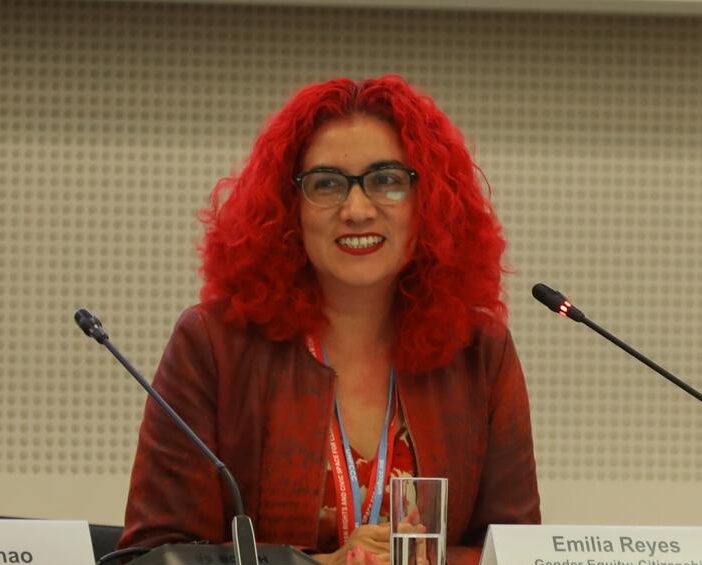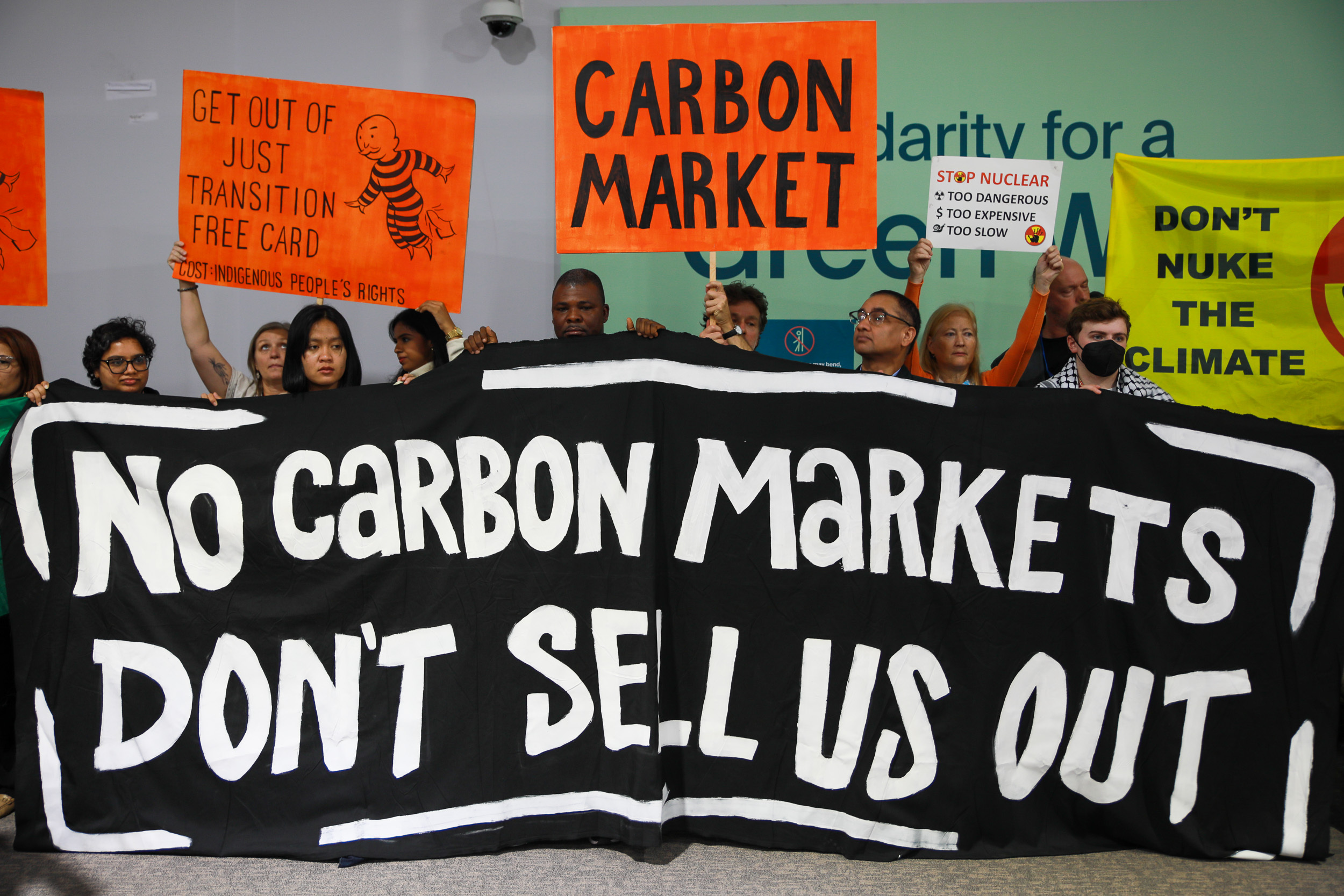COP29 Feminist Reflections: What’s next after COP 29’s Climate Finance Fiasco?
by Emilia Reyes
Many things have been said already about the fiasco around the New Collective Climate Finance Goal (NCQG) in COP 29 in Baku. The Third World Network gave a detailed account of events around the approval of the document, including the outrage that was felt in the Plenary room after it bulldozed and was imposed on Global South countries, as it was gaveled by the Presidency.
A poor deal indeed, for the new climate finance goal. The key words are the commitment by developed countries to “mobilise” (which refers to a “wide variety of sources”) $300 billion USD, as opposed to a “provision” of climate finance. As Josh Gabbatis explains, a “provison” goal would have meant public funding and concessional finance. The language is very slippery, it reads that this amount will be disbursed “by 2035”, which gives a leeway to escape an annual commitment. As Asad Reman mentions, taking into-account inflation, this is a laughable sum. With the regular investments by MDBs, private sector, blended-finance as debt instruments (such as bonds), there is no real trajectory for new money to be channeled towards the needs of Global South countries regarding mitigation, adaptation and loss and damage. It pains us to read the agreement, with every paragraph burying deeply the institutional framework based on Common But Differentiated Responsibilities, since the document also calls for developing countries to contribute to the goal. Every possible harmful reference to mega-projects, false solutions, loans, MDBs mission-creep, carbon markets as “climate finance”, is there. Brandon Wu explains this is a great escape by developed countries from their historical obligations, all of them hiding behind the US.
A big question then, to be answered collectively is: What is the value of the UNFCCC? Its capture by the interests of economic and fossil fuel elites is part of a larger effort by wealthy countries to dismantle multilateralism. Therefore, the answer I believe cannot be tackled in isolation. Many hard conversations are to be had among us in the months to come.
I have heard people’s expectations about bringing the demand of an effective climate finance goal to the IV Financing for Development Conference (FfD), which will take place from June 30 to July 3, 2025 in Seville, Spain. I think the path is not as straightforward as it may look like.
First of all, because in the same way that some people are looking at the FfD Conference to bring about alternatives to the NCQG agreement, Global North countries will try to ratify and embed the agreement across the FfD outcome. So far the Elements paper released by the co-facilitators in the last week of November already mention it, including as well the bland roadmap drafted by COP 29 Presidency. The role of the MDB’s, which was ratified in the Pact for the Future, is also suggested as a document to be linked closer to the FfD outcome, but that would entrench furthermore the views of those who want to maintain the status quo. Of course, all these elements would have to be strongly rejected by us in our advocacy efforts, but it shows that there is also a hard scenario ahead.
Second, there is a big misunderstanding about what the FfD space is all about. It is mostly a normative space, in which the global economic and financial dynamics are discussed. To treat this as a space for “fundraising” for our causes would be a major wasted opportunity to challenge the root of the problem: the neoliberal capitalist system that prioritizes the dynamics of capital above those of the reproduction of life.
Third, as dire as the climate emergency is, it is one of the nine planetary boundaries. So far we have surpassed six out of those nine. Each of those planetary boundaries are interconnected, and climate change and biodiversity have cross-cutting effects in the rest. There are intergovernmental processes that address some aspects of these planetary boundaries, trying to ensure their conservation and restoration, such as the current negotiations on plastics, or the ones that take place under the other two Rio Conventions (on biodiversity and desertification). Each one of these have met strong resistance by wealthy countries to deliver on their historical responsibilities with the destruction of the integrity of the biosphere cycles. An example of this is what happened in the COP of the Biodiversity Convention, in Cali, this year. Again, the debate centered around finance, but the evasion of commitments was such, that the COP closed without any financial agreement, and with an expiration for the conversations on these issues, given the lack of quorum. In the negotiation on plastics, there is also a demand by developing countries around a Fund that could help them address the much-needed urgent action. Instead of the support, Global South is also facing a strong backlash with the presence of 220 fossil fuels lobbyists (outnumbering even the number of EU delegates), that are attempting to undermine references to the entire cycle of life of plastics, that originates in the extraction of these materials.
So, in the face of these enormous needs to ensure the ecological integrity, it is high time to reflect on the siloed work that different movements are doing. There is certainly a need to obtain funding and money to promote ecological and climate action, and polluters must pay without a doubt. But furthermore, what is needed is a system change to shift away from the current economic system that is depleting life in the planet, harming those who least contributed to damage the planet, while increasing inequalities. In the current system, there is for sure a historical responsibility by wealthy countries (the same culprits, over and over again), in promoting an economic system that serves their interests and those of their elites, including monopoly capital around the world.
The IV FfD Conference is a space in which we join more voices to demand a reform of the global financial architecture to democratize economic decision-making regarding public and private resources, fiscal justice, debt justice, trade justice, technology justice, digital justice, ecological justice and more, all while ensuring human rights and gender equality for all. Furthermore, it has to be the space in which Global South countries focus on their demands on sovereignty, self-sufficiency and autonomy, so that economies on the ground are prolific and provide for the material conditions of life.
The IV FfD Conference is the opportunity to center structural demands and realign a vision that encompasses the wellbeing of people and the planet, in which we confront those responsible for criminal extractive colonial and imperial practices, capturing key decision-making spaces and reducing the space for self-sufficiency and autonomy for the Global South. It will also be a space to ask hard questions to those Global South leaders that are swaying in their voices to align themselves with foreign interests, prioritizing the dynamics of capital above life. But more than that, it will offer the unique space to get together as movements and unite our voices in a plural and encompassing call for justice.
The discussion of climate finance in the UNFCCC in the form of the NCQG delivered, once more, peanuts. Let us not be distracted then. We should keep our focus on the health of the Planet and bring about justice for those who have endured harm for so long. The IV FfD Conference can be a useful space, but only if we are united in challenging the economic system.

Emilia Reyes is programme director of policies and budgets for equality and sustainable development at Gender Equity: Citizenship, Work and Family, co-convenor of the Women’s Working Group on Financing for Development, and co-lead of the Economic Justice and Rights Action Coalition. She is a coordinator of the Campaign of Campaigns, promoting cross-movement mobilisation around macro-economic and environmental issues. She is also a contributing author in the segment “Gender, Climate Justice and Transformative Pathways” of the IPCC report: Climate Change 2022: Impacts, Adaptation and Vulnerability.


